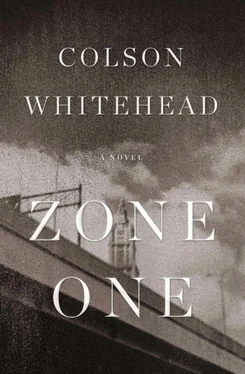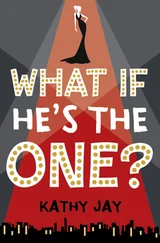Back then, if the worst happened, his phone would transmit the coordinates of his murdered body to the satellite and back down to the authorities and eventually to his parents on Long Island. What a quaint notion, to die while looking for cool T-shirts.
The sweepers unlocked the gates and gained the platform. They did not speak. They tightened the straps of their night-vision goggles and waited for their eyes to recalibrate to a new, murky-green modality that made them into scrabbling things at the bottom of a deep-sea chasm. It was as the Lieutenant described it: a decrepit dungeon, with a slow, miasmal atmosphere and secret topography. Trevor said, “Looks like we just missed the train,” and they laughed and walked over to the hooked ladder at the south end of the platform.
Gamma was a unit of mellow bandwidth, third-generation potheads to a man, who couldn’t wait for the new era of marijuana tolerance sure to come in reconstruction, the legislative no-brainers and utopian buds. “When we put it all back together, we will institutionalize joy,” Foreskin said, “for the medicinal toke is the balm of oblivion.” Richard Cowl, a.k.a. Dick Cowl, a.k.a. Foreskin, was Gamma’s leader and a former sommelier at a high-end novelty eatery in Cambridge that specialized in offal. “Which is sort of amusing, given the skel’s yen for human entrails. They’re my regulars!” Even in these times of scarcity he was a vegetarian. He never sampled the exotic delicacies on his employer’s menu but accomplished a mean pairing nonetheless. According to him, at any rate—pre-plague triumphs were often exaggerated, given the lack of contradicting witnesses.
Joshua and Trevor were the other two Gammas. The only description Joshua gave of his former life was that “I was an alcoholic, and I’m still an alcoholic.” One Sunday at Wonton, Josh related how his mother flipped on Last Night and Mark Spitz almost shared his similar tale but declined. Josh didn’t have the bearing of one who was going to make it to the other side; there was something taffy to him, despite the fact he’d survived this long, and to tell him the story would be like pouring coffee into a broken saucer. As for Trevor, he had been a mall security guard in the bright, prelapsarian days of shopping abundance. When they met, Gary teased that Trevor must be glad to “finally have a real gun” after his stint as a fake cop, and Trevor had replied evenly that he hadn’t needed a gun in his mall rounds. He had everything he needed in his hands—Trevor was a master-level practitioner of a branch of martial arts Mark Spitz had never heard of but, after an impromptu demonstration, had become convinced of its lethal pedigree. Gamma got high every night, the minute they bivouacked for the night, “In police stations if one is handy,” Foreskin said.
One of the most solemn rounds of rock-paper-scissors in human history ruled in favor of Omega: Gamma was on point. “It’s all right,” Foreskin said. To draw the skels out, Josh started playing an old heavy metal song on a kazoo. The title eluded Mark Spitz. In the video the band played a bar mitzvah dressed in thick biker leather. Top-notch anti-skel gear in retrospect, save for the exposed neck. Soon they were all humming the song, then giddily crooning it at the top their voices.
The Franklin Street station hove into sight when they heard a holler, back from Canal. Safeties clicked. The dead did not speak. Was it some misbegotten freak who’d been eking it out down here, hiding? Mark Spitz had never come across a true homesteader, but the marines had rounded up a few on their first rounds through the Zone. Citizens who’d locked themselves in insubstantial one-bedrooms and unlikely studios and somehow made it through until the soldiers came to take back the city. What must it have been like, to see the choppers after all that time, after they’d emptied the larder of hope and had only mealy, unleavened stubbornness to chew on? Marines sliding down cables, grinding up the bodies of the dead with their .50-.50s, those devils that had besieged them for so long. They were insane, most of them, and had to be pried out screaming before being taken to the Wonton medics, where the top-shelf antipsychotics awaited. One or two attacked their rescuers, shooting the soldiers in the head, unable to believe in their deliverance—and some homesteaders were no doubt mistaken for skels in turn, palsying in their PASD. There weren’t many, but they did exist. Some homesteaders were still immured north of the barrier; a few managed to signal choppers and were plucked from the roofs. Perhaps others shrank from view when they heard a helicopter, content in whatever doomsday theater played out in their traumatized heads.
Omega and Gamma readied their weapons. Gary lit a cigarette. Mark Spitz thought of the old sign in the token booths: I AM THE STATION MANAGER. I AM ASSISTING OTHER CUSTOMERS. YOU WILL RECOGNIZE ME BY MY BURGUNDY VEST. The man identified himself, and when he got close enough Mark Spitz saw he was not wearing a burgundy vest. It wasn’t some transit authority rep or bearded subterranean hermit who hailed them, but the Lieutenant, in full combat gear, the first time they’d seen him so outfitted. Their laconic boss was aboveground in Wonton; down here he was a real soldier, veteran of the calamity. Shamed, the sweepers assumed their idiosyncratic versions of combat stances. “Thought I’d tag along and get some exercise,” the Lieutenant said.
He hadn’t geared up in months, “But it’s like riding a bike. A hell-bike, made out of hell.” Over whiskey the following Sunday, he confided to Mark Spitz and Kaitlyn that he’d had a bad feeling about Broadway, ever since Buffalo gave the green light.
Mark Spitz kept tripping over the crossties. He didn’t like walking in the rut, where the bilge seeped into his boots, so he jumped from tie to tie like a kid in a hopscotch grid. He was paranoid about the niches cut into the wall, where a track worker might duck if caught in front of a train. Each black hole harbored a skel, each maintenance corridor was full of hostiles about to spill onto the track, the native population bursting from their shadow habitat to rout the invaders.
“We’ve never been on the subway before,” Gary said.
“Usually you ride in train cars,” Mark Spitz said.
“Do you think they’ll start it up again?”
“Have to get around somehow. Zone One, Zone Two. Once they get the juice on.” The subway will be reduced in the next world, stripped of its powers like some punished god. Forced to recapitulate childhood stages, when it extended through the savage city neighborhood by neighborhood, line by line.
“Queens?”
“I don’t think we’re sweeping Queens anytime soon,” the Lieutenant said. “It’s Queens. But yeah, there will be power.”
“It will be nice to watch TV again,” Kaitlyn said.
“Certainly,” the Lieutenant said. “There’s some idiot in Bubbling Brooks right now thinking up a plague sitcom.” He whirled at a scurrying sound, then resumed his march. “Filmed in front of a live studio audience. Half filled.”
Mark Spitz imagined the hunchback in the cement-block chamber a mile beneath the city, sweating through a yellowed wifebeater, who hit the switch. A hundred thousand refrigerators hum-to at once, 12:00 blinks on the displays of a million microwave ovens and digital video players, all the sad machines that had shut off in the middle of their humble duties, waiting for orders. The hallway lights of tenements and corporate towers snap on, and in the underground, the red and green signal indicators. The magic third rail in deadly awareness. The machines wake to a new world where their old routines are void. As if they were human beings powered down by the plague and then reinitialized for an alternative purpose.
Читать дальше












